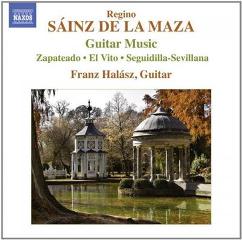Regino Sáinz de la Maza - Guitar Music (2014)
Regino Sáinz de la Maza - Guitar Music (2014)

1. Zapateado 2. La Frontera de Dios: II. Meditacion 3. Rondena 4. Petenera 5. La Frontera de Dios : I. Albada y paisaje 6. 4 Obras Originales: No. 1. Baile de Munecas 7. El Vito 8. La Frontera de Dios: III. Idilio 9. Solea 10. La Frontera de Dios: IV. Romancillo de Maria Belen 11. Canciones Castellanas 12. La Frontera de Dios: V. Sacrificio 13. Alegrias 14. 4 Obras Originales: No. 3. Recuerdo 15. Estudio in A Minor 16. Seguidilla-Sevillana 17. 4 Obras Originales: No. 2. Meditacion 18. 4 Obras Originales: No. 4. Minueto 19. Cantilena Franz Halász – guitar
‘It weeps for distant / things. / Hot southern sands / yearning for white camellias.’ Describing ‘The weeping of the guitar’, Spanish poet (and friend of Regino Sáinz de la Maza) Federico García Lorca evokes an adoring lament and ceaseless longing for Spain in his lyrical poetry. In this CD, with Rioja-ruddied cheeks, the composer and the guitarist brim with flamenco-feeling.
These compositions reflect a humble background, the influences of Miguel Llobet and Manuel de Falla, experience as a performer, and the composer’s Spanish identity. Ricardo Iznaola, Sáinz de la Maza’s student, observed: ‘As a composer, he wrote exclusively for the guitar in a stylised idiom that drew heavily on Castilian and Andalusian folk song’. On this CD, the German guitarist Franz Halász pays tribute to these central tenets of the composer’s intention and style.
Lorca, commenting on Sáinz de la Maza’s charismatic personality and charm when performing in Granada, stated that: ‘Like Llobet and Segovia, he is a knight errant who, with his guitar over his shoulder, travels through country after country, absorbing everything and leaving the places through which he passes full of ancient melancholy music’. This admixture of suave nonchalance and chivalric pomp contend well under Halász’s musicianship. Being in a heightened state of emotion where expression is purely authentic and unaffected by superfluities, he composes with soul or ‘duende’. According to Lorca: ‘Duende is a power, not a work. It is a struggle, not a thought.’ Lorca adds that he heard an old maestro of the guitar say that duende ‘is not in the throat; the duende climbs up inside you, from the soles of the feet.’ Not a question of ability but of ‘true, living, style, of blood, of the most ancient culture, of spontaneous creation’, duende, according to Lorca, is the heart of the music. On this recording it is clear that Halasz gives of his body and soul.
Like a musical rendition of Lorca’s poem entitled The Song of the Barren Orange Tree, Meditación (track 2) is shatteringly beautiful and Halász imbues it with untrammelled, unrestrained sensitivity. Solea (track 9) from the Spanish word ‘soledad’ meaning ‘solitude’ unravels at the seams to expose a scarlet filigree. With expressive strumming and tender picking, Halász’s dramatic dynamic exchange from ferociously vigorous to quietly graceful is utterly captivating. Dancing rhythms devolve and dissolve into movements of colours as shadowy soledad is cloaked in longing. In Sacrificio (track 12) Halász uses tremolo to deliver an uninterrupted flow of melody.
With clarity and precision, the much acclaimed and award-winning - he won first prize in the Andrés Segovia Competition in Spain in 1993 - Halász combines weightless grace with quicksilver alacrity. His full-bodied and age-oaked yet fresh sound emerges from a recording of optimum quality. ---Lucy Jeffery, musicweb-international.com
download (mp3 @320 kbs):
uploaded yandex 4shared mediafire mega solidfiles zalivalka cloudmailru filecloudio oboom








